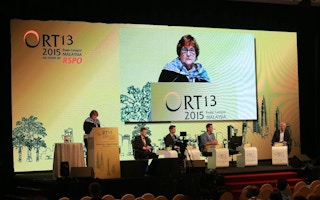The Roundtable on Sustainable Palm Oil (RSPO) on Thursday unveiled a new scheme to endorse palm oil producers whose sustainability efforts go beyond thebasic requirements for environmentally and socially responsible practices.
To continue reading, subscribe to Eco‑Business.
There's something for everyone. We offer a range of subscription plans.
- Access our stories and receive our Insights Weekly newsletter with the free EB Member plan.
- Unlock unlimited access to our content and archive with EB Circle.
- Publish your content with EB Premium.
The RSPO Next label, which was first mooted earlier this year, verifies that companies which have committed to no deforestation, no peat planting, and human rights protection, are delivering on them. It will be a premium label for companies which have gone the extra mile to ensure their products are sustainable.
The finalised criteria for the label were announced at the industry association’s roundtable conference in Kuala Lumpur, Malaysia held last week.
It is a voluntary addition to the RSPO stamp, which requires growers to demonstrate good environmental management of their plantations, and that they respect the rights of indigenous communities and workers, among other things.
However, green groups have criticised these existing standards for failing to protect ecologically valuable forest land, limit the greenhouse gas emissions caused by plantation development, and prevent its members from clearing and draining peatland.
Several companies in the past few years have published commitments that go beyond RSPO standards, including pledges on “No Deforestation, No Peatland, and No Exploitation”. Singapore-based Golden Agri Resources, Wilmar International, and Cargill are a few examples.
At a plenary session on RSPO Next, Liza Murphy,who is director of German consultancy Are We There Yet? and led a group which developed the new criteria, shared that the Next label will provide independent verification of company efforts to fulfil these commitments.
A company must have at least 60 per cent of its palm oil output certified by RSPO before it can apply for the RSPO Next label, and there are some requirements - such as greater transparency - which theorganisation must meet in order to use this premium label.
Further down the supply chain, consumer product and food manufacturers must also commit to buying RSPO Next certified oil, said Murphy. The full RSPO Next documentation, which includes implementation details will be published on January 31 next year, she added.








